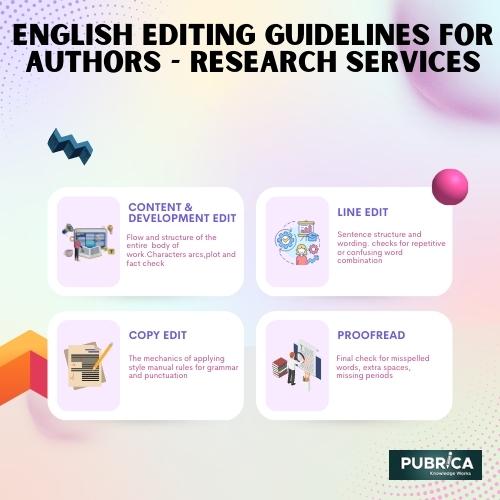English editing guidelines for authors
English editing guidelines for authors
The following provides writers with precise linguistic recommendations to ensure their article adheres to the MDPI style. All papers should be in decent English with clear language to aid editors and reviewers.
Papers approved following peer review are subjected to modest English language editing; however, if you believe your work would benefit from editing sooner, you may request it through the Pubrica English editing service. Please provide a copy to the Editorial Office if you use an alternate service that gives an editing confirmation certificate. Authors from economically developing countries (or nations) might consider joining AuthorAid, a worldwide research community that offers researchers networking, mentorship, resources, and training.
As an author, you can follow several English editing guidelines to improve the quality and readability of your writing. These guidelines apply to various forms of writing, including books, articles, reports, and essays.

Here are some essential English editing tips to consider:
- Revise for clarity: Ensure that your ideas are expressed clearly and straightforwardly. Avoid ambiguity and vague language. Be concise and eliminate unnecessary wordiness.
- Check for grammar and punctuation: Review your writing for correct grammar usage, including subject-verb agreement, tenses, and sentence structure. Pay attention to punctuation, such as commas, semicolons, and apostrophes.
- Edit for spelling and typos: Carefully proofread your work for spelling errors and typographical mistakes. Spelling errors can undermine the credibility of your manuscript copy editing.
- Maintain consistency: Keep consistent with the use of tense, style, and formatting throughout your writing. Inconsistent language and formatting can be distracting for readers.
- Avoid jargon and technical language: Unless writing for a specific technical audience, use language that is easily understood by a broader readership. If you must use technical terms, provide clear explanations or definitions.
- Use active voice: Active voice often creates more direct and engaging sentences. Passive voice can make sentences sound clunky and less dynamic.
- Choose appropriate vocabulary: Be mindful of the words you use. Ensure they convey the precise meaning you intend. Avoid unnecessary repetition and choose words that best suit your tone and target audience.
- Break up long sentences and paragraphs: Long blocks of text can be overwhelming for readers. Divide lengthy sentences and paragraphs to make the content more digestible.
- Organize your content logically: Ensure your writing flows logically from one idea to another. Use clear headings and subheadings to help guide readers through your work.
- Eliminate clichés and overused phrases: Try to find fresh and original ways to express your ideas. Overused phrases can make your writing sound uninspired.
- Check for consistency in references: If you're using citations, footnotes, or endnotes, make sure they follow a consistent style, such as APA, MLA, or Chicago.
- Seek feedback: After editing your work, consider seeking feedback from beta readers, fellow authors, or writing groups. Fresh perspectives can help you identify areas for improvement.
- Read it aloud: Proofreading your writing aloud can help you catch awkward phrasing, repetitive language, and other issues that might be less noticeable when reading silently.
- Take breaks between editing sessions: Give yourself some time between editing sessions. Stepping away from your writing and returning to it with fresh eyes can help you spot errors or areas for improvement more effectively.
- Use editing tools: Utilize writing and manuscript editing tools, such as spell-checkers and grammar-checkers, but don't rely solely on them. They can be helpful, but not infallible, and human judgment is crucial.
Remember that editing is an iterative process. It's rare to produce a flawless piece of writing in one go. Take your time, be patient, and be willing to revise and refine your work until it reaches its full potential.
Give yourself the Medical edge today
Each order includes
- On-time delivery or your money back
- A fully qualified writer in your subject
- In-depth proofreading by our Quality Control Team
- 100% confidentiality, the work is never re-sold or published
- Standard 7-day amendment period
- A paper written to the standard ordered
- A detailed plagiarism report
- A comprehensive quality report

